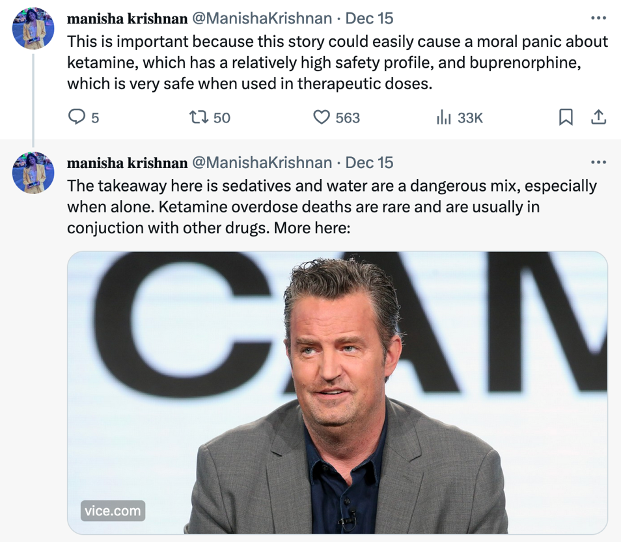Don't mention ketamine's addictiveness
The US media's bizarre response to Matthew Perry's death
This week, the Los Angeles coroner released their autopsy into Friends actor Matthew Perry’s sudden death, attributing it to the ‘acute effects of ketamine’. Perry was apparently receiving ketamine therapy infusions every other day at an LA clinic for a period, although LA Times reports he reduced his dosage recently. And he was apparently taking it at home unsupervised. It was his fatal decision to take a high dose of ketamine and then sit in his swimming pool that led to him drowning (so perhaps ‘acute effects of ketamine in a pool’ would be a more accurate cause of death).
I don’t want to focus on this man’s tragic last moments. What struck me was how quickly figures from the ketamine industry defended the drug in the hours after the coroner’s report was published. Ketamine, we were told, is ‘incredibly safe’, it has a ‘very low risk profile’, and we shouldn’t give in to any ‘drug war rhetoric’. It wasn’t the ketamine that killed Perry, it was the swimming pool that he drowned in. Above all, please, nobody mention that ketamine is addictive.
For example, Dr Ryan Marino, a toxicologist and promoter of ketamine therapy, warned about the ‘unhinged misinformation news cycle’ we are ‘about to see’.
Manisha Krishnan, an Emmy-award-winning journalist who writes on drugs for Vice, took to Twitter to warn against a ‘moral panic’ against ketamine.
It wasn’t the drug, it was the swimming pool that killed Perry, said some. Others, like leading ketamine vender Dr Philip Wolfson, said ‘he really did himself in’.
Dr Sam Mandel of Ketamine Clinics Los Angeles insisted: ‘There's no connection between therapeutic, clinic use of ketamine and what happened with Matthew’. Yes, there was a whole week between Perry receiving ketamine at an LA clinic and his fatal use of it at home, and only a rabid anti-drugs ideologue would connect the two.
Two other spokespeople for the ketamine industry took to social media to say it was disrespectful, harmful and ‘gross’ to use a celebrity’s tragic death as a reason to question a drug’s safety. Neither of them mentioned that they themselves sell psychedelic treatments to people recovering from addiction.
So where is this ‘moral panic’, this wave of anti-drug rhetoric and demonisation of the ‘incredibly safe’ ketamine? Let’s have a look at the US media’s reporting on ketamine in the wake of the coroner’s report. Did the headlines scream about the risks of ketamine - and specifically, the principal risk, which is that people become psychologically dependent and end up addicted to it, damaging their minds, bodies and bladders in the process?
Here's USA Today’s coverage – no mention of ketamine’s addictiveness.
Here’s the New York Times coverage – no mention of ketamine’s addictiveness
Here’s the LA Times coverage – no mention of ketamine’s addictiveness.
Here’s NBC News coverage – no mention of ketamine’s addictiveness.
Here’s Fox News – no mention of ketamine’s addictiveness
Here’s ABC News – no mention of ketamine’s addictiveness
Here’s CBS News – no mention of ketamine’s addictiveness
Only one American media outlet saw fit to mention that ketamine can be addictive.
That was Business Insider (in this piece) – they’re one of the few publications who have sounded the alarm about the booming ketamine market and its potential to cause damage.
Fox News, meanwhile, followed up its earlier piece with another story dismissing ‘5 myths about ketamine’, one of which was ‘ketamine is addictive’. ‘The drug is safe and effective, experts say’. And who were these experts? Doctors whose livelihood depends on selling ketamine. In the UK, professor David Nutt also published a defence of ketamine’s safety - and failed to mention he is chief scientist at a ketamine company.
The rise of Big Ketamine
Norm Macdonald used to joke about ‘Big Acid’, as if there was an LSD industry duplicitously hyping its benefits. Well, Big Ketamine is a thing these days. By one account there are now over 800 ketamine clinics around the US, up from just 20 in 2019. There are ketamine companies like MindBloom that deliver straight to your door, and there is Spravato, Johnson and Johnson’s best-selling ketamine nasal spray, sales of which grew 87% this year. There’s a whole industry that’s crystallized around ketamine - ketamine media relations companies, ketamine software companies, ketamine advertising companies, lobbyists promoting ketamine to congress, senators and even presidents. No doubt soon there’ll be a designer range of adult diapers.
Ketamine has been sold as the answer to America’s mental, physical, spiritual and even military needs - the $800 billion National Defence Authorization Act, passed this week, included a provision for ketamine therapy for soldiers and veterans, thanks to Senator Cramer, who assured his North Dakota donors that millions of federal dollars would flow to the ketamine clinics in his state.
Let’s not be too cynical - for some people, especially those with treatment-resistant depression, ketamine really can be helpful. I have friends who tell me it was life-saving when they were really depressed.
However, the sheer speed at which the ketamine industry has grown should raise concern about medical profiteering.
Ketamine clinics in the US are in a brutal struggle for survival. They are either expanding, selling out to bigger clinics, buying other clinics to grab market share, or going bust. This is why clinics are spending so much on advertising and marketing – they’re desperately trying to become ‘six figure clinics’ before they go bust.
Occasionally one gets a glimpse of the ethical standards of some of these clinics – as in the tragic case of Malibu millionaire doctor David Sawusch.
After the paywall, readers write in with reports of over-prescribing to minors in ketamine clinics, and this week’s other psychedelic news including the new NDAA bill’s $10 million provision for psychedelic research.








